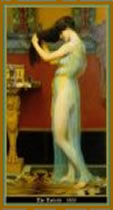The History of Aromatherapy

Some of the earliest writings about the use of aromatic or essential oils on the body have been found in China and date from around 2000 years BC. most evidence of widespread use of oils comes from ancient Egypt where oils were used in offerings to their gods. In India some 2000 years BC various writings mention 'perfumers' and 'incense sellers'. Evidence suggests oils were used mainly for their aroma. When we reach around 400 years BC, Hippocrates, the 'father' of medicine, writes that 'the way to health is to have an aromatic bath and scented massage every day'. Here we have a clear link between aroma and health as well as massage and health.
.There are many other writings through history in many civilisations on the use of essential oils. More recently in around the 10th century, Arabian physician Avicenna wrote many books on the properites and benefits of essential oils. in the 13th century, mainly as a result of the crusades, a growing industry in perfume making came about in France, establishing the country's reputation as the home of perfumery.
Between 1200 and 1600 there were many books written on the practice of herbal medicine throughout Europe. In the 17th century Lavender gained a reputation as a preventative to the plague and was used extensively in posies and perfumed gloves.

The popularity and benefits of essential oils developed continuously through to the early 19th century with Lavender leading the way, then they began to lose ground in favour of the new 'scientific' and powerful substances that began to emerge in medicine, which by and large were accompanied by many and various side effects. For a time, the use of essential oils was mainly confined to the perfume industry. The resurgence of interest in essential oils for therapy can be linked to two major events. the move during the 20th century towards more natural forms of treatment and the work of Professor Renee Gattefosse in France. Gattefosse was a chemist who began work with essential oils during the first world war, mainly with Lavender. He discovered the healing properties of Lavender whilst experimenting in his laboratory. Whilst working he burned his hand and plunged it into the nearest bowl which actually contained Lavender oil. He was amazed at the rapid recovery of the burn and apparent lack of blistering or scars. In doing this he rediscovered the healing properties of lavender oil, which had been lost throughout the 'scientific' age in the 19th century. Gattefosse coined the term 'aromatherapie' to describe the use of essential oils in therapy. His work was continued by another French physician, Dr. Jean Valnet who wrote a book called aromatherapie. A biochemist, Marguerite Maury, translated the work of Gattefosse and Valnet into formulas and recipes, which her physician husband used with his patients. Their work produced a great deal of evidence about the use and benefits of essential oils.
Marguerite Maury spent a great deal of time in the U.K. teaching a whole new generation of aromatherapists. The renewed interest in all things pure and natural is a blatant rejection of the 'pop a pill' mentality that predominated in the mid 1900's.





